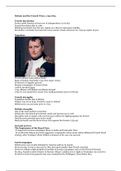Britain and the French Wars, 1793-1815
French Revolution
France aided America in their war of Independence (1775-83)
French Revolution hits in 1789
British government view the new regime as a threat to European stability
Revolution eventually descends into mass murder. Death sentences for 1793-94 equals 16,500
Napoleon
French military and political leader
Siege of Toulon, December 1793, first major victory
Promoted to brigadier general
Became commander of Army of Italy
1798 he invaded Egypt
1799, alliance with Britain and Russia formed
1799, he was named first consul. Now leading greatest power in Europe
French strengths
Population double that of Britain
Empire was not as huge, therefore easier to defend
British army was not great prior to 1793
British strengths
One of the most modern economies
British also introduced government stocks and income tax in 1798
Had allies such as Austria who received £4.6 million for fighting against the French
Had the most powerful navy in the world
Had previously won the Seven Years’ War against the French (1756-63)
On land and sea
The Supremacy of the Royal Navy
-It supported overseas campaigns (those in India and Peninsular War)
-At sea Horatio Nelson proved an aggressive commander whose iconic status influenced French Naval
strategy, after Trafalgar (1805), British command of the seas was assured.
Land campaigns
British army was recently defeated by America and low in morale
From 40,000, it rose to 250,000 by 1815, but much smaller than French conscript
However willing to fight peripheral (outside of Europe) campaigns such as the Iberian Peninsula
By 1813, Napoleon (after disaster in Russia) still got 1 million men to fight in Peninsular war, however
he left the work to his generals who were outmatched by Wellington. Final defeat 1815.





